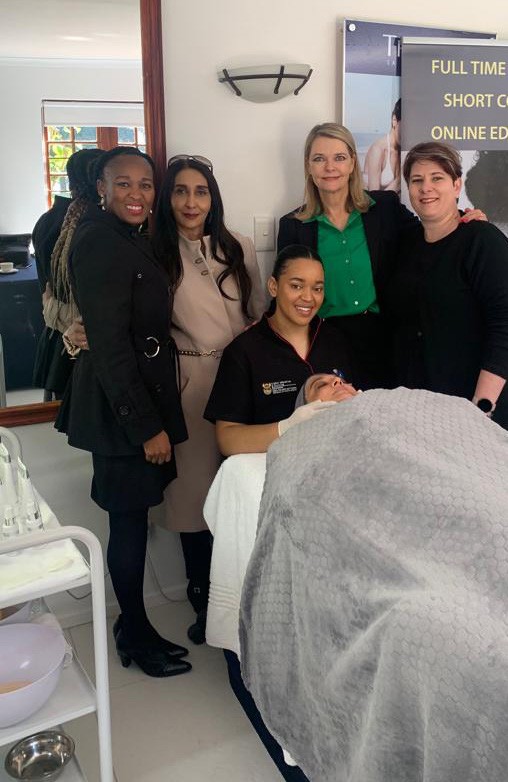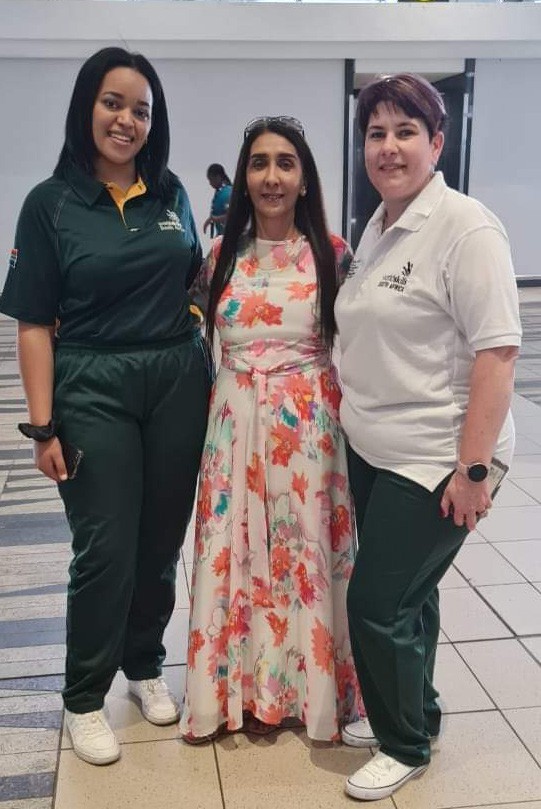Talking to…
FEROZA FAKIR
Joanna Sterkowicz speaks to industry veteran and trailblazer, Feroza Fakir, about challenges facing the beauty sector and how it has evolved over the decades
What are the major problems in the industry today, apart from the poor economy and load shedding?
A big challenge is that unqualified therapists, and therapists who fake qualifications, are providing services to the unsuspecting public. Some of them are using highly technical devices and think that learning on YouTube is okay. This problem is compounded by these devices being freely available for purchase online. Official regulations governing such devices would definitely help.
My personal opinion is that the industry needs a higher level of regulation to encourage recognised skills and competence. I have also come across many therapists who have done short courses and are now performing aesthetic treatments for which they are unqualified. So, I always encourage them to study further as there are additional courses available to support them. However, the vicious circle of costs for further training play an adverse role in this scenario.
You have been in the industry for over 40 years – what changes have you experienced since you started out?
South Africa’s Apartheid system created educational inequalities. In 1979, when a close friend of mine and I decided to pursue our career in beauty, we were unable to attend the school of our choice. A school in Hillbrow, owned by a French lady called Rene Lacey, offered a one year Diploma Course in Beauty Culture. The level descriptive was very different in those days. Our Diploma on completion listed the following subjects – Anatomy & Physiology, Facials, Body Therapy, Manicures, Pedicures, Nail Technology, Waxing Hot / Cold, Brow Shaping, Tweezing, Tinting Individual Lashes, Facial & Body Massage, Make-up and Advanced Make-up.
Our difficulties were many. The multiple segregation laws for transport and social mingling made our lives difficult, as the beauty industry is one which thrives on social interaction for the development of one’s learning by bouncing off ideas and techniques between various industry sectors. Without the ability to freely travel and mingle within certain circles, these developments were stunted and limited.
Once we completed our beauty course, we wanted to pursue further studies and found a private multiracial college in the Johannesburg CBD, owned by Aleit Pretorius. He incorporated a higher level of education as he bought in state-of-the-art equipment for both facial and body therapy. This included oligo dermie, interferential, high frequency, ozone therapy, hydrotherapy, colour therapy, massage therapy, aromatherapy, reflexology, infrared sauna, electrolysis, body wraps for slimming, cellulite treatments, waxing, sugaring and advanced make-up products.

At WorldSkills 2022 – Chazney Jacobs, Feroza Fakir and Lerina Bosch

Preparing for WorldSkills
In 1986 I partnered with Aleit Pretorius to start Lenasia’s Le Beaute School and then in 1996, I owned my own salon in Lenasia called Electrolysis and Beauty Clinique. I employed five therapists and it was very successful. My specialties were electrolysis and facials.
You have long been passionate about skills development – what is your personal history in this regard?
I opened a school called Lenasia Academy of Health & Skin Care in 1998. In the same year, I was appointed by the HCSITB (Hairdressing Cosmetology & Beauty Industry Training Board) to write a new syllabus for electrolysis and machinery. I also became an accredited examiner for them and did accreditation for all the FET (Further Education Training Institutions) for Beauty. The NQF (National Qualifications Framework) was then established in South Africa with the development of SAQA (South African Qualifications Authority) and I was subsequently nominated to serve on the Standard Generating Body for Hairdressing Cosmetology & Beauty under NSBS (National Standards Body) 11 by SAQA.
It was in 1998 that the dire need to improve skills development resulted in parliament ratifying the Skills Development Act, which defined a new Sector Training and Education Authority (SETA) system. The plan was to develop a series of sector skills plans within a clearly defined framework of the National Skills Development Strategy. In March 2000, the then Minister of Labour, Membathisi Mdladlana, formerly established 23 SETAs, each with its own clearly defined sector and sub-sectors.
When the NQF & SETAS were established, I was nominated to many boards and committees and I had to choose between my business and skills development. This is when I ventured into the skills development arena.
I have often been asked by industry stakeholders why do I do what I do. Everyone has a purpose and mine has always been to serve the industry. My passion is to share my knowledge as it gives me so much fulfilment. I have been honoured at many levels in our industry and community (such as being featured in Panache Publication’s WOW Top 50 Inspiring Icons) and I thank those who trust and believe in me. My aim is to continue to serve with humility where I am needed.
Sharing or spreading knowledge is part of contributing positively to humanity in Islam and is considered a charity that people contribute to. I initiated the WorldSkills Competition with the Services SETA for the Beauty Sector, so that graduate therapists could compete internationally. I am still involved in project managing the Beauty WorldSkills Competition in South Africa and am the Deputy National Expert.
Why did South Africa introduce the NQF system?
The objectives of the NQF are to: create a single integrated national framework for learning achievements; facilitate access to, and mobility and progression within, education, training and career paths; enhance the quality of education and training; and accelerate the redress of past unfair discrimination in education.
By 2001, the NQF was under review, and after that, the 1995 SAQA law was replaced by the National Qualifications Framework Act (No. 67 of 2008). SAQA is a statutory body that is regulated in terms of the NQF Act No. 67 of 2008 [2]. It is made up of 29 members appointed by the Minister of Education in consultation with the Minister of Labour. As such, SAQA is mandated by legislation to oversee the development and implementation of the NQF [3].
You have been actively involved in industry organisations – please elaborate.
In 1996 I was nominated for SABA (South African Beauty Association) and started as a secretary for this organisation.
Two years later I was nominated to serve on the Industry Training Board for Hairdressing Cosmetology & Beauty, where I represented the Beauty Industry.
Our industry was under threat in 1997 as part of the industry applied to go with the Allied Health Association. However, SABA was not in favour of registration with this body. I attended many meetings to object. In 1998. I was nominated as the President of SABA. In the same year I started negotiations with SAAHSP (South African Association of Health & Skincare Professionals), which was then under the leadership of Philippa Crichton. In 2003 SAAHSP and SABA amalgamated under my and Philippa’s leadership. With lots of engagement, we decided to have one board in South Africa.
For seven years I was also the president of BHSEA (Beauty, Health & Skincare Employers Association), registered with the DOL (Department of Labour).
In addition, I was involved in mapping standards for the IPSN (International Professional Standards Network) for Beauty with different countries.